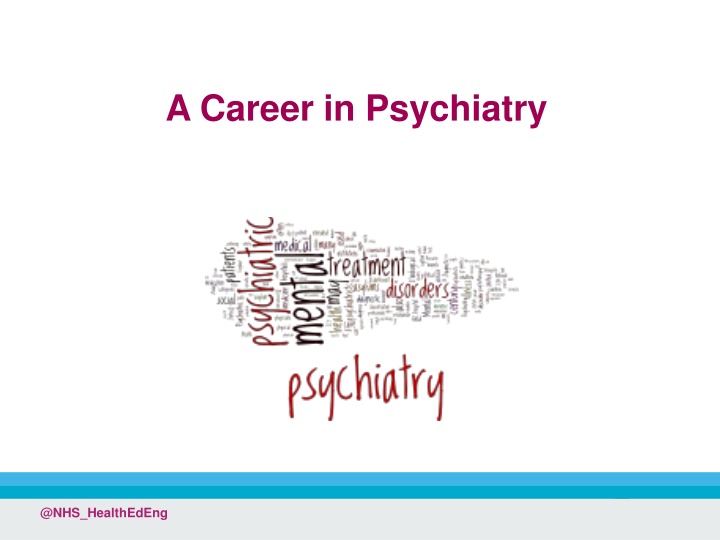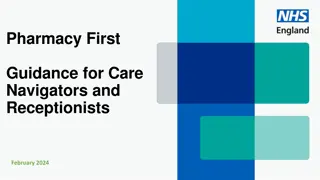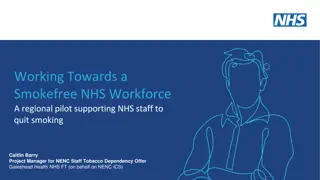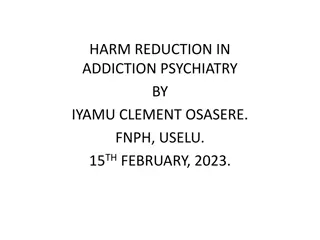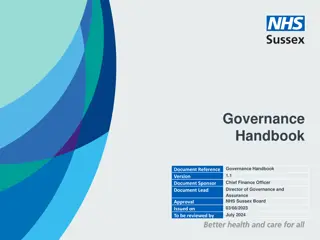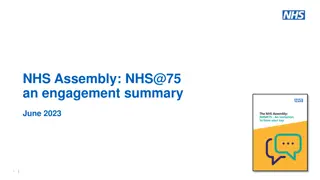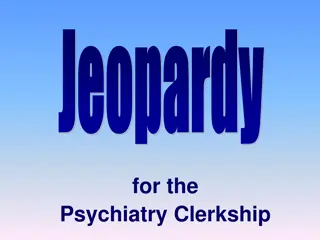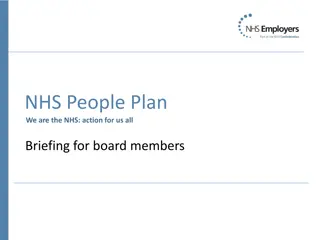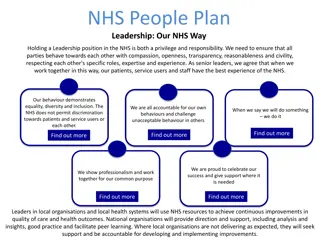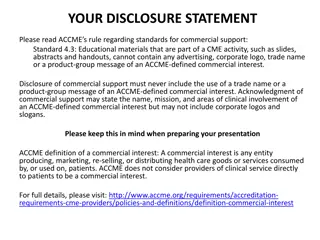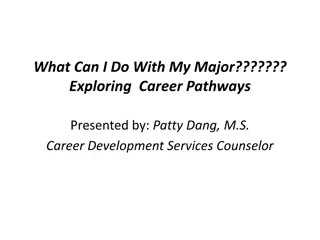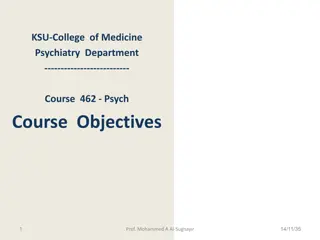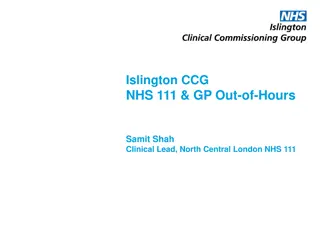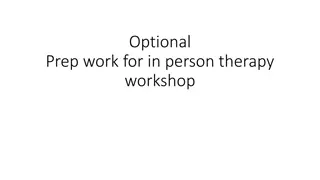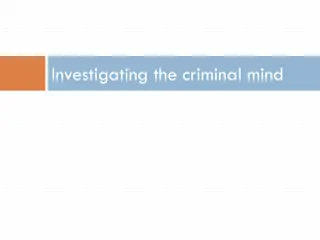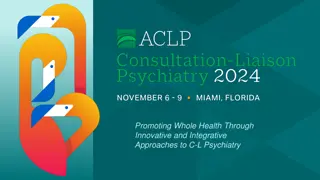Psychiatry Career Overview at NHS
Branch of Medicine focusing on assessment, diagnosis, and treatment of mental and behavioral disorders across various subspecialties such as General Adult Psychiatry, Child and Adolescent Psychiatry, and Forensic Psychiatry. Explore potential pathways, roles, and responsibilities within this field.
Uploaded on Feb 25, 2025 | 0 Views
Download Presentation

Please find below an Image/Link to download the presentation.
The content on the website is provided AS IS for your information and personal use only. It may not be sold, licensed, or shared on other websites without obtaining consent from the author.If you encounter any issues during the download, it is possible that the publisher has removed the file from their server.
You are allowed to download the files provided on this website for personal or commercial use, subject to the condition that they are used lawfully. All files are the property of their respective owners.
The content on the website is provided AS IS for your information and personal use only. It may not be sold, licensed, or shared on other websites without obtaining consent from the author.
E N D
Presentation Transcript
A Career in Psychiatry @NHS_HealthEdEng
Contents Psychiatry Overview General adult psychiatry Child and adolescent psychiatry Old age psychiatry Psychotherapy Intellectual disability (Formerly Learning disability) Forensic psychiatry Career Pathway Competition ratios Further Information (Please click on topic for direct link) @NHS_HealthEdEng
What is Psychiatry? Branch of Medicine involving the assessment, diagnosis and treatment of mental and behavioural disorders Broad range of subspecialties:- o GeneralAdult Psychiatry o OldAge Psychiatry o Forensics o Child andAdolescent o Psychotherapy o Intellectual Disability o Perinatal Psychiatry o Rehabilitation Psychiatry @NHS_HealthEdEng
What is Psychiatry? Subspecialties @NHS_HealthEdEng
What is Psychiatry? GeneralAdult Subspecialty involving assessment, diagnosis and treatment of mental and behavioral disorders in individuals aged 18-65 (although new ways of working on the basis of needs as opposed to age) Work within community and inpatient settings Potential for further sub-specialisation including Liaison Psychiatry, Substance Misuse, Perinatal Psychiatry and Neuropsychiatry @NHS_HealthEdEng
What is Psychiatry? General Adult Typical daily roles can include:- o Monitoring in outpatient clinics o Assessment in acute settings (at the patient s home, place of safety) o Regular ward reviews within context of inpatient settings o Working within or alongside crisis teams to work with acutely unwell patients and provide alternative to hospital admission @NHS_HealthEdEng
What is Psychiatry? General Adult On call commitments may involve:- o Assessment in A&E departments, place of safety with police escort o Conducting mental health act assessments to determine whether an individual needs to come into hospital and be assessed and/or treated against their will @NHS_HealthEdEng
What is Psychiatry? Child and Adolescent Subspecialty involving assessment, diagnosis and treatment of children and young people (under 18 years of age) Includes developmental and behavioural disorders such as autism,ADHD and mental disorders such as depression and psychosis Work within inpatient and community settings @NHS_HealthEdEng
What is Psychiatry? Child and Adolescent Typical daily roles include:- o Monitoring in the community within outpatient clinics o Assessment at the young person s home, school or college o Ward reviews within context of inpatient settings o Working closely with families and carers o Working closely with safeguarding teams and social workers @NHS_HealthEdEng
What is Psychiatry? Child and Adolescent On call commitments may involve:- o Assessment inA&E departments, place of safety with police escort o Conducting mental health act assessments to determine whether an individual needs to come into hospital and be assessed and/or treated against their will o Working closely with safeguarding teams and social workers Additional Reading @NHS_HealthEdEng
What is Psychiatry? Old Age Psychiatry Assessment, diagnosis and treatment of organic disorders such as dementia and functional disorders e.g. depression Working within community settings (outpatient clinics, at the patient s home or residential homes) or inpatient settings @NHS_HealthEdEng
What is Psychiatry? Old Age Psychiatry Typical daily roles include:- o Monitoring in the community within outpatient clinics o Assessment at the person s home or residential home o Ward reviews within context of inpatient settings o Working closely with families and carers o Good understanding of co-morbid physical conditions @NHS_HealthEdEng
What is Psychiatry? Old Age Psychiatry On call commitments may involve:- o Assessment inA&E departments, place of safety with police escort o Conducting mental health act assessments to determine whether an individual needs to come into hospital and be assessed and/or treated against their will @NHS_HealthEdEng
What is Psychiatry? Psychotherapy Treat individuals with a broad range of diagnoses Work can be carried out individually, in groups, within therapeutic communities or with family members Therapists use range of techniques to explore difficult emotions and experiences @NHS_HealthEdEng
What is Psychiatry? Intellectual Disability Assessment, diagnosis and treatment of mental disorders / neurodevelopmental disorders / challenging behaviour in individuals who have intellectual disability Working within the community (eg patients homes, residential care and outpatient clinics) and inpatient settings. @NHS_HealthEdEng
What is Psychiatry? Intellectual Disability Typical daily roles include:- o Home visits and outpatient clinics o Ward reviews within context of inpatient settings o Working closely with families and carers o Multidisciplinary working @NHS_HealthEdEng
What is Psychiatry? Intellectual Disability On call commitments may involve:- o Assessment in community settings with specialist ID crisis team o Assessment inA&E departments and places of safety o Mental health act assessments to determine whether an individual needs to come into hospital and be assessed and/or treated against their will @NHS_HealthEdEng
What is Psychiatry? Forensics Assessment, diagnosis and treatment of offenders with mental and behavioural disorders Based in secure psychiatry units (low, medium and high) or work within prisons or the community @NHS_HealthEdEng
What is Psychiatry? Forensics Typical daily roles include:- o Monitoring in the community within outpatient clinics o Assessment in prisons; prison clinics o Writing court reports On call commitments may involve:- o reviews of psychiatry inpatients in seclusion o assessments in prison to consider appropriateness for admission to hospital @NHS_HealthEdEng
What do Psychiatrists treat? Depression Bipolar Disorder Schizophrenia Eating Disorders Learning Disabilities Drug andAlcoholAddiction Anxiety Personality Disorders Dementia Perinatal Illness Developmental Disorders @NHS_HealthEdEng
Where do Psychiatrists work? Psychiatrists can work in a variety of settings including:- In the Community o Within Outpatient Clinics o In GP surgery o At the patient s home o In schools o In Nursing Homes o In Police Stations and prisons o InA&E Inpatient psychiatry wards Inpatient medical and surgical wards @NHS_HealthEdEng
Who do Psychiatrists work with? Psychiatrists work within a multi-disciplinary team including:- Psychiatry Nurses Psychologists Health CareAssistants Pharmacists Occupational Therapists Social Workers Psychotherapists @NHS_HealthEdEng
What agencies do Psychiatrists work with? Psychiatrists communicate regularly with a broad range of agencies including:- Schools Police Law Courts Social Workers Residential Homes @NHS_HealthEdEng
How do Psychiatrists treat? Medication Psychological Therapies ECT @NHS_HealthEdEng
How to be a Psychiatrist: Training Undergraduate: o Completion of an undergraduate medical degree (5 6 years) Postgraduate: o Enter foundation training o 6 x 4 month medical, surgical and specialty posts o Following completion of Foundation Training, eligible for application to Core Specialty Programme such as Psychiatry Specialty application: o Core psychiatry training is 3 years comprising of 6 x 6 month posts o These include community/inpatient general adult and old age posts with opportunities for posts within subspecialties @NHS_HealthEdEng
How to be a Psychiatrist: Training During their training, Psychiatry trainees will be expected to sit and pass 2 written papers and 1 clinical exam These examinations must be completed within core training before eligible to apply for higher training @NHS_HealthEdEng
How to be a Psychiatrist: Training Higher Training At least 3 years 6 programmes: General Adult, Old Age, Child and Adolescent, Psychotherapy, Forensics, Intellectual (Learning) Disability Can apply for dual training which enables CCT in 2 subspecialties (e.g General Adult and Old Age, Child and Adolescent and Forensics @NHS_HealthEdEng
Why Psychiatry? No health is without mental health Holistic care of the individual Interesting and Challenging Multidisciplinary team working Versatile; working in a variety of different settings with different disciplines and agencies Variety of treatment approaches (pharmacological and psychological) Supportive of less than full time training @NHS_HealthEdEng
Recruitment- Competition Ratio 2021 Competition Ratios @NHS_HealthEdEng
Personal Qualities Person Specification @NHS_HealthEdEng
Where to go for more information Royal College of Psychiatrists NHS health careers https://www.eastmidlandsdeanery.nhs.uk/psychiatry https://www.westmidlandsdeanery.nhs.uk/postgraduate- schools/psychiatry @choose_Psych (twitter) @NHS_HealthEdEng
